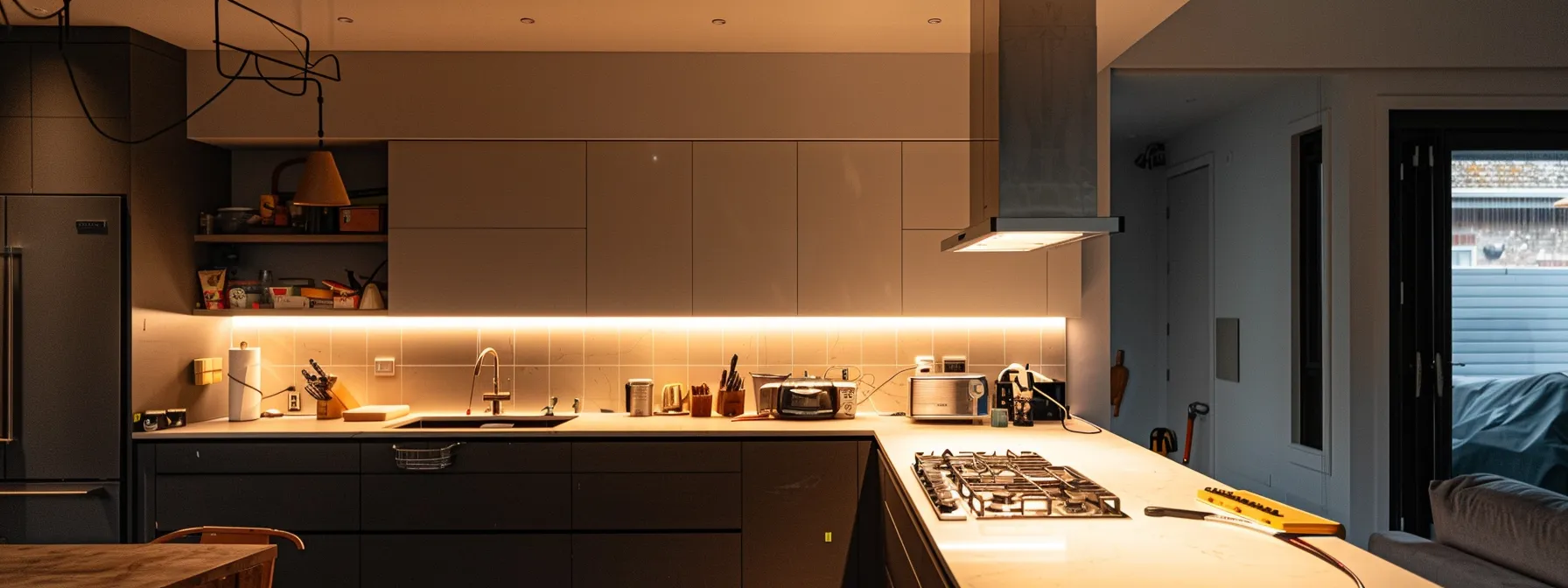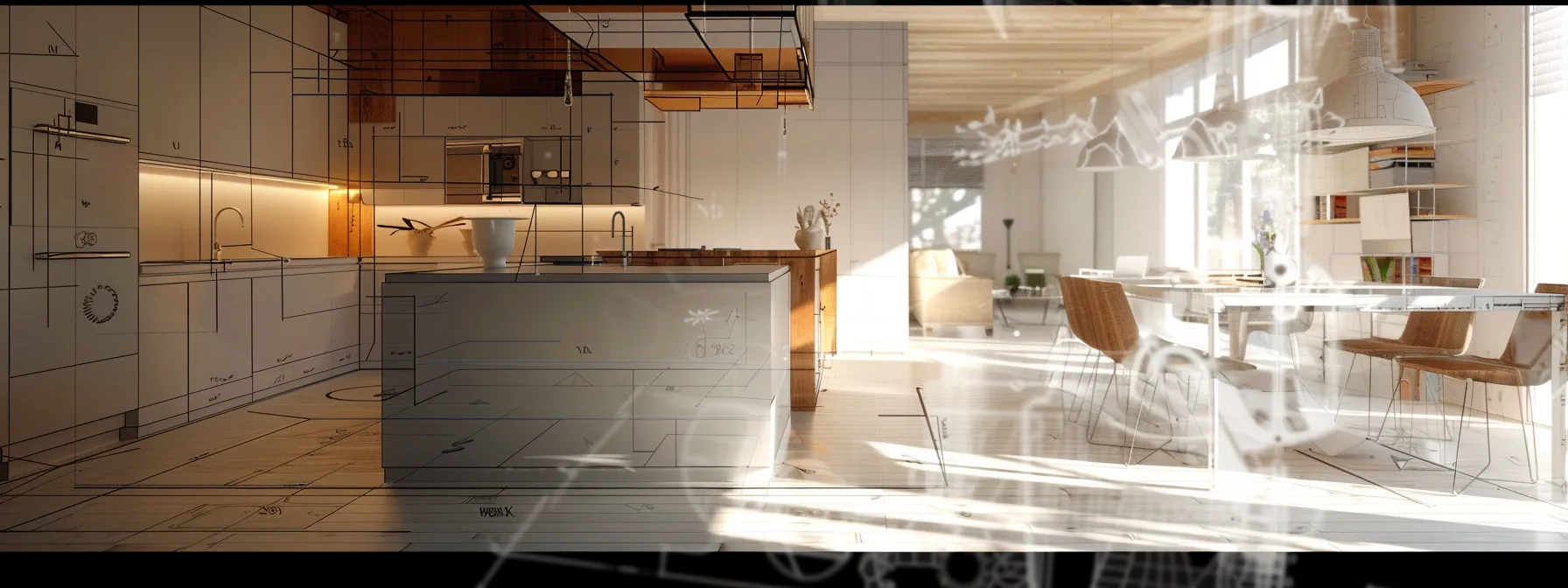

Maximizing efficiency in kitchen remodeling projects can significantly reduce stress and save time and money. Many homeowners struggle with managing the complexity of renovations, leading to delays and overspending. This article will provide practical steps, such as setting up a robust project management plan and choosing the right professionals, to streamline the renovation process. By implementing these strategies, readers can tackle their remodel with confidence, ensuring their kitchen transformation is done efficiently and effectively.

Identifying clear goals for a kitchen remodel is essential for effective planning. Homeowners should assess their current kitchen layout to maximize space and efficiency. Additionally, determining necessary upgrades, such as kitchen cabinets, countertops, tile, and drywall improvements, is crucial for achieving an optimal interior design that meets their needs. Each of these steps will enhance both functionality and aesthetic appeal.
Identifying clear goals for a kitchen remodel is a critical first step in maximizing efficiency. Homeowners should work closely with a general contractor to assess their current layout and determine how improvements can enhance both functionality and customer satisfaction. Establishing priorities will help streamline the decision-making process and reduce unnecessary dust created by multiple revisions throughout the project.
Effective communication of these goals can also lead to better budgeting and planning. For instance, homeowners may wish to upgrade countertops or cabinets while improving the overall workflow between the kitchen and adjacent areas, such as the bathroom. This approach not only promotes efficiency but also creates a harmonious space that meets the homeowner’s needs and lifestyle.
Assessing the current kitchen layout is a vital step in maximizing efficiency for a remodeling project. Homeowners should conduct thorough research on their existing floor plan to identify potential bottlenecks and areas that do not promote smooth workflow. Engaging with professional construction teams can help uncover layouts that prioritize both safety and practicality, reducing the risk of costly changes later in the process.
During the assessment, it is essential to consider how the existing space facilitates cooking, cleaning, and dining activities. Effective project management involves streamlining the layout to enhance functionality while aligning with the homeowner’s lifestyle. By focusing on these factors, homeowners can make informed decisions that result in a kitchen that truly meets their needs, paving the way for a successful renovation journey.
Determining essential features and upgrades is a foundational aspect of kitchen remodeling that requires careful consideration. Homeowners should pay attention to elements such as countertops, cabinetry, and flooring materials like wood, which can significantly impact both the kitchen’s functionality and aesthetic appeal. Selecting high-quality materials and upgrades is not just about price; it often influences the long-term value of the home and the quality of daily use.
During the remodeling process, homeowners should also ensure they have the right liability insurance in place to protect against potential issues that may arise during demolition and construction. Engaging professional contractors for their expertise can lead to efficient planning and execution of necessary upgrades. This approach not only minimizes risks but also ensures that the finished kitchen meets both practical needs and personal taste, ultimately enhancing the overall living experience.

A robust project management plan is essential for maximizing efficiency in kitchen remodeling projects. It involves creating a comprehensive timeline that outlines key milestones, allocating resources effectively to ensure all materials, including cabinetry, are on hand, and defining roles and responsibilities among the team. These steps help streamline the renovation process, making the home improvement journey smoother and more organized.
Creating a comprehensive timeline is vital for a successful kitchen remodel, as it allows homeowners to visualize the entire renovation process from start to finish. A reputable kitchen remodeling company will assist in developing a realistic schedule that incorporates essential phases, such as design, construction, and finishing touches. This systematic approach minimizes disruptions and ensures that critical tasks, such as addressing potential mold issues, are handled promptly to maintain a safe work environment.
A well-structured timeline also emphasizes the importance of sustainability in the remodel. Homeowners should allocate time for selecting eco-friendly materials and incorporating energy-efficient appliances, which can significantly enhance the overall return on investment. By planning ahead and considering every aspect of the kitchen remodel, homeowners can create a functional space that aligns with their personal values while maximizing efficiency throughout the project.
Allocating resources effectively during kitchen remodeling projects requires a well-thought-out strategy that ensures both time and budget are utilized wisely. Understanding the specific needs of the renovation can lead to optimal resource allocation, including labor, materials, and equipment. For example, scheduling delivery of cabinetry and other materials in sync with construction phases minimizes waiting time, thus keeping the project timeline on track and reducing disruptions that may arise from delays.
Additionally, compliance with local building regulations is crucial, as it can influence both the choice of materials and the schedule of the project. By fostering clear communication with contractors and suppliers about regulatory compliance requirements, homeowners can create a smoother workflow that addresses potential hurdles ahead of time. This proactive approach not only helps keep the project within budget but also enhances the overall quality of the kitchen remodel, ensuring that the final result reflects both personal style and practicality.
Defining roles and responsibilities within a kitchen remodeling project is vital for maintaining clarity and ensuring efficiency. Each team member, from the general contractor to subcontractors, should have a clear understanding of their specific tasks related to the property. This structure minimizes miscommunication and helps avoid costly delays, as everyone knows who is responsible for what at every stage of the remodel.
Establishing these roles also streamlines the decision-making process, allowing for quicker resolutions to any issues that arise. For example, if a plumbing issue occurs, knowing who to contact directly prevents unnecessary setbacks and keeps the project on track. A well-defined hierarchy within the team enhances accountability and ensures that every aspect of the kitchen remodel is addressed effectively:

Setting a realistic budget for a kitchen remodel is essential for ensuring maximum efficiency throughout the project. Homeowners should prioritize essential expenses to focus their financial resources effectively. Monitoring costs continuously will help avoid overruns and align spending with the planned budget. Each of these considerations plays a crucial role in achieving a successful and stress-free remodeling experience.
Setting a realistic budget for a kitchen remodel is a critical step to ensure a successful and efficient project. Homeowners should begin by researching the costs associated with materials and labor in their area, allowing them to realistically allocate funds for upgrades such as cabinets, countertops, and appliances. This initial investment in careful planning will help manage expectations and prevent financial stress during the renovation.
To streamline the budgeting process, homeowners can prioritize essential features based on their specific needs and lifestyle. For instance, focusing on high-impact areas like cabinetry and counter surfaces can yield better functionality and aesthetic results. By clearly outlining costs and sticking to the plan, homeowners can maximize value while achieving their ideal kitchen space:
Prioritizing essential expenses in a kitchen remodel enables homeowners to focus their budget on the most impactful areas. By directing financial resources toward upgrades that enhance functionality, such as quality cabinets and durable countertops, homeowners can maximize both utility and aesthetic appeal. This targeted approach not only ensures meaningful improvements but also helps maintain a manageable budget throughout the renovation.
Investing in high-priority features early on can prevent costly adjustments later in the project. For example, addressing vital aspects such as plumbing and electrical upgrades on the front end gives homeowners confidence that their kitchen will not only look great but will also function efficiently for years to come. This prudent financial planning ultimately leads to a smoother remodeling experience, allowing homeowners to enjoy their new kitchen without the stress of unexpected expenses.
Monitoring costs throughout the kitchen remodeling project is essential for maintaining budgetary discipline and achieving desired outcomes. Homeowners should regularly review expenditures against the initial budget to identify any discrepancies early on. This proactive approach allows them to make necessary adjustments, ensuring that spending aligns with planned investments, such as high-quality cabinets and efficient appliances.
Engaging with contractors to discuss budget updates can provide valuable insights into where adjustments may be necessary. For instance, if unexpected costs arise during renovations, homeowners can collaboratively evaluate alternatives that may help mitigate these expenses. This constant communication fosters a transparent environment, helping to keep the project on track and reducing the risk of financial surprises as the remodeling progresses.

Hiring the right professionals is crucial for maximizing efficiency in kitchen remodeling projects. Homeowners should seek tips for hiring a qualified contractor, understanding how to collaborate effectively with designers and planners, and establishing clear communication channels. Each of these aspects will enhance the overall project management, ensuring a seamless journey toward creating the ideal kitchen space.
When hiring a qualified contractor for kitchen remodeling projects, homeowners should start by researching potential candidates thoroughly. This includes checking online reviews, seeking recommendations from friends or family, and verifying licenses and insurance. A reliable contractor will offer a portfolio of previous work, showcasing their expertise and style, which can help homeowners determine if they match the desired vision for their kitchen remodel.
Furthermore, effective communication is key when working with a contractor. Homeowners should clearly outline their expectations, budget, and timeline during initial discussions. Establishing a detailed contract that delineates roles, responsibilities, and payment schedules can prevent misunderstandings later. This proactive approach sets the foundation for a successful remodeling experience:
Collaborating with designers and planners is vital for achieving a successful kitchen remodel. Their expertise in creating layouts that optimize space and functionality can significantly improve the overall project efficiency. Homeowners should engage these professionals early in the process to ensure that their vision aligns with practical design elements that enhance both aesthetics and workflow.
Effective communication during this collaboration is essential to address potential concerns and preferences. By clearly sharing needs and expectations, homeowners can help designers and planners craft solutions that reflect their lifestyle and usability requirements. This approach not only promotes a more streamlined design process but also helps prevent misunderstandings that could lead to costly revisions later on:
Establishing clear communication channels is fundamental for the success of kitchen remodeling projects. Homeowners should discuss their goals and expectations with contractors from the outset, ensuring everyone is on the same page regarding timelines, budgets, and design visions. This transparency allows for swift resolutions to any issues that may arise, enhancing the overall efficiency of the project.
Additionally, regular check-ins throughout the remodeling process further strengthen communication. By scheduling consistent updates, homeowners can track progress and address any concerns promptly. This proactive approach fosters collaboration between all parties involved, leading to a smoother remodeling experience and ultimately resulting in a kitchen space that meets the homeowner’s specific needs and desires.
Coordinating deliveries and installations is crucial for maintaining project timelines in kitchen remodeling. Keeping an organized worksite enhances efficiency and safety, allowing for smooth progress. Implementing quality control measures ensures that every aspect meets high standards, providing homeowners with confidence in the workmanship. Each of these strategies plays an important role in streamlining the renovation process and achieving a successful kitchen transformation.
Coordinating deliveries and installations is vital to the success of kitchen remodeling projects. Homeowners should work closely with contractors to create a detailed schedule that aligns the arrival of materials with installation phases. This approach prevents delays and ensures that resources are on hand when needed, facilitating a smooth workflow that keeps the project moving forward efficiently.
An organized delivery plan also helps manage space at the worksite, reducing congestion and hazards that can arise from uncoordinated arrivals. By establishing clear communication channels with suppliers and contractors, homeowners can ensure timely updates on order statuses. This proactive strategy allows adjustments to be made quickly, maintaining the renovation timeline and enhancing overall project efficiency.
Maintaining an organized worksite is key to achieving efficiency in kitchen remodeling projects. A tidy space minimizes the risk of accidents and allows contractors to focus on their tasks without distraction. By clearly designating areas for tools, materials, and equipment, professionals can quickly locate what they need, reducing downtime and keeping the project on track.
Homeowners benefit significantly from an organized work environment as it enhances communication and workflow among the entire remodeling team. When each contractor understands their designated areas and has easy access to necessary supplies, it fosters a more collaborative atmosphere. This structured approach ultimately leads to faster project completion and a smoother renovation experience.
Implementing quality control measures throughout the kitchen remodeling process is essential for ensuring high standards and satisfaction. By conducting regular inspections and utilizing checklists, homeowners can verify that each phase of the renovation meets established expectations. This proactive strategy not only identifies potential issues early but also maintains the timeline and budget, which is critical for a smooth renovation experience.
Engaging professionals who prioritize quality assurance significantly contributes to successful outcomes in kitchen remodeling projects. These experts assess workmanship and materials continuously, ensuring that they align with the homeowner’s vision and practical needs. With consistent communication and feedback loops, homeowners can stay informed and confident in the remodeling process, resulting in a beautifully finished space that meets their requirements:
Conducting a final walkthrough ensures that every detail of the kitchen remodel meets expectations and allows for any necessary adjustments. Gathering feedback from household members provides valuable insights into the functionality and design of the new space. Additionally, documenting lessons learned from the project can inform future renovations, enhancing efficiency and ensuring continued satisfaction.
Conducting a final walkthrough is a pivotal step in the kitchen remodeling process that ensures every detail meets the homeowner’s expectations. This comprehensive review allows homeowners to confirm that all upgrades, from cabinetry to appliances, align with their vision. Addressing any concerns during this stage can lead to immediate resolutions, ensuring a smooth transition into enjoying the newly remodeled space.
During the walkthrough, homeowners should engage in open communication with their contractor about functionality and design. Discerning any last-minute adjustments promotes a successful outcome and enhances overall satisfaction. It is also an opportunity to gather feedback from family members, enabling a more nuanced understanding of how the new kitchen serves daily activities, paving the way for future renovations if necessary:
Gathering feedback from household members is a vital part of the kitchen remodeling process. Engaging family members during the final stages ensures that everyone’s needs and preferences are considered, promoting satisfaction with the finished product. Encouraging open communication can help identify any concerns or suggestions regarding the functionality and design, which helps tailor the kitchen space to be more efficient and enjoyable.
Homeowners can benefit from creating a structured approach to collect feedback. Conducting informal discussions or guided surveys about the remodeled kitchen can yield valuable insights into how well the renovation meets daily activities. Such contributions not only improve the current project but also provide lessons for future renovations, ensuring long-term efficiency and satisfaction with the kitchen space:
Documenting lessons learned during a kitchen remodeling project is essential for improving future endeavors. Homeowners should create a comprehensive record of challenges faced, solutions implemented, and successful strategies. This approach not only aids in identifying what worked best but also highlights areas needing improvement, ultimately fostering a more efficient remodeling process in future projects.
By reflecting on past experiences, homeowners can apply valuable insights to enhance project management and decision-making. For example, if certain materials proved difficult to obtain or specific timelines were unrealistic, this knowledge can guide adjustments in planning and resource allocation. As such, a focused documentation process can lead to smoother transitions in subsequent renovations, maximizing efficiency and satisfaction in future kitchen remodeling projects:
Maximizing efficiency in kitchen remodeling projects is crucial for achieving a successful and satisfying transformation. By clearly defining goals, assessing the current layout, and determining essential upgrades, homeowners can make informed decisions that enhance both functionality and aesthetic appeal. Implementing a robust project management plan, setting a realistic budget, and choosing the right professionals further streamline the renovation process. Ultimately, these strategies not only improve the overall quality of the kitchen but also ensure that the space aligns seamlessly with the homeowner’s lifestyle and preferences.
